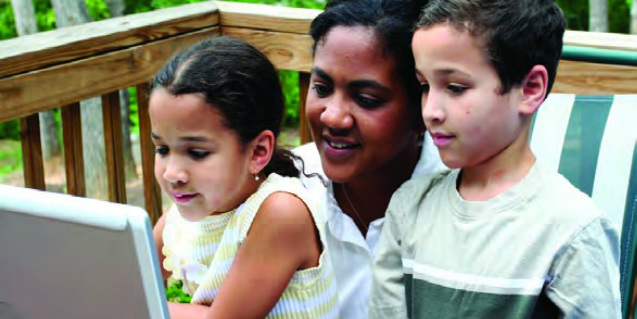|
Good communication helps children to develop confidence, feelings of self worth, and good relationships with others. It makes life with them more pleasant, and helps them grow into adults who respect themselves and others.
1. Communicate acceptance: Accepting the child just as he is makes it easy to communicate with him. The child who feels accepted will be more likely to share his feelings and his problems. 2. Use door openers: Door openers are invitations to say more, to share ideas and feelings. They tell the child that you are really listening and interested, that his ideas are important, and that you accept him and respect what he is saying. 3. Use “you-messages” to reflect the child’s ideas and feelings: “You-messages” describe the child’s feelings and encourage him to express his troublesome feelings. When children are allowed to express bad feelings freely, they seem to disappear like magic. 4. Use more do’s than don’ts: Tell the child what to do rather than what not to do. The Don’ts: “Don’t drag your coat on the ground. The Do’s: Hold your coat so it doesn’t drag. 5. Listen attentively: Get rid of distractions and listen to what the child is saying. 6. Use “I-messages” to communicate your thoughts and feelings: Often children don’t know how their behavior affects others. “I-Messages” are effective when the child misbehaves. 7. Make requests simple: Because young people have a hard time remembering several instructions at once. 8. Say “please”, “thank you”, and “you’re welcome” to children: Children deserve the common courtesies which adults use with each other. And children learn by imitating the speech and behavior of adults. Let them learn good things from you. 9. Communicate at eye level: When talking with very young children, it may be necessary to stoop down to their level or to sit at a table with them. Adults often fail to realize the effect their size has on small children. 10. Don’t interrupt children: Let them finish what they started out to say. 11. Don’t use unkind words which tear the child down: Unkind words have unkind results and they cut off communication. Avoid unkind words that are ridiculing (“You’re acting like a big baby”), shaming (“I’m ashamed of you”), or name-calling (“You’re a bad boy”) 12. Use kind words to encourage and build up the child: Kind words bring happy results! They give the child more self-confidence and help him to do better.
0 Comments
1. Have set times of family devotions. Put some effort into planning this time so that it’s varied and fun and something to look forward to. (Editor's note: You can find some great, free Christian devotionals for kids of all ages at FreeKidStories and My Wonder Studio.) 2. Use the time that you study God’s Word together as an opportunity to pass on to your children your enthusiasm for learning and discovering new spiritual treasures. 3. Work together to adopt spiritual principles and habits. Use lots of positive reinforcement and make it fun, by deciding together on specific goals and rewards for achievements. 4. Pray together often—before meals, for safety on outings, for the day, and before bed. These prayers can be short and simple, and just a regular part of your everyday life. 5. Share your prayer requests with one another. Set up a “prayer board,” which lists needs and requests, and check them off as they are answered. You can also add verses that can be claimed in prayer. 6. Work on a Bible verse memory project together. Put up a chart listing everyone’s names and the memorization goal. Decide on a prize when the goal is completed. 7. Watch a meaningful movie or documentary together, and talk about it. Share your thoughts and perspectives and highlight any significant spiritual principles reflected in it. 8. Celebrate holidays in a way that acknowledges the true intent behind the special date or glorifies God in some way. (This can be done even with non-Christian celebrations.) 9. Foster a culture of sharing and giving to God and to others. Set aside your tithe as a family, and/or set aside extra gifts for special times of year. Decide together on whom you will give to, or come up with a project that will benefit those in need. 10. Hear from the Lord as a family for important decisions, or on matters that affect everyone. Discuss the situation and then ask the Lord for His guidance, and take a few minutes of silence to hear from Him. 11. Be an example to your children of godly values in action. Remember that they are observing your words and deeds, and will learn more from your daily example and actions than from all the admonitions you could give them. Text courtesy of The Family International. Used with permission.
— By Jorge Solá My three year old son Manuel was playing an educational game on the computer when his six-year old sister Alondra demanded that he let her have a turn. Manuel’s response was typical. “I was here first!” I don’t know where Manuel picked that up, but it got me thinking. It’s a generally accepted principle of human society that those who “get there first” have more rights than those who get there after them. The first one to find a pearl in the sea, or strike gold or oil may claim it as his own. The first one to make a scientific discovery or invention may patent his find and claim any profits that may result. The first one to sit at a restaurant table has more right to it than the fellow who arrives later. The first one to settle in on a particular spot on the beach becomes the owner of that spot for the day. In my children’s case, if one of them has been playing for half an hour at the computer, I tell him or her that it’s time to let the other one have a turn. Most other parents probably do something similar. But if we applied that principle to every aspect of society, there would be absolute chaos. Can you imagine a landowner saying, “I’ve had this plot of land for quite a while, so it’s time to let someone else enjoy it”? Or can you imagine a man who has a good job giving it to someone else who is out of work and short of money? Those examples are rather extreme, but what about little acts of selflessness? How often do you see people who have a seat on the bus or subway offering it to able-bodied others who have just boarded, simply because they look like they’d appreciate a chance to rest their weary feet? Are little sacrifices like that too much to expect?—Or do we fail to make them simply because we don’t see anyone else making them and no one really expects us to do so either? It’s a matter of selfishness, when you get right down to it, and selfishness is part of our sinful human nature. But with God’s help we can break out of that mold, overcome our selfish first reactions, swim against the tide, and do the loving thing. If we give to him who asks of us, and if we don’t turn away from those in need, we will surely find that as we give, we will receive. Those are certainly revolutionary concepts in this day and age. If we would practice this kind of love, and teach our children to do the same, so many problems would disappear. The world would be a different place. Courtesy of Motivated magazine. Used with permission.
Compiled from parenting.com
There’s nothing wrong with store-bought playthings, but here are fun, stimulating things you can do better: 1. Reinforce the “Aha!” Think of your baby as a budding scientist and watch for moments of revelation: the smile in the bath that means “Yes! I get the rubber duck when I’m in the water!” The waving arms that translate as “When Daddy makes that face, I’m going to be tickled!” Fulfill your infant’s simple expectations and share her joy at being right. 2. Hold your baby upright when he’s alert. Infants see most clearly when they’re vertical, not horizontal. So prop him up in your lap to show him new objects, and hold him up to look over your shoulder when you take him on a tour of his brand-new world. 3. Develop facial as well as verbal dialogues. Well before babies can even baby talk, you’ll see your infant attempt to replicate your facial expressions. Make different faces and watch how her interest perks up. “Listen” and respond to her expressions. 4. Rock ‘n’ roll. To satisfy your baby’s craving for motion, waltz him around the room, swing him gently to and fro, bounce him slowly up and down, sit in a swivel chair and see how he takes to a spin in your lap. 5. Encourage tasting. Think of her mouth as a sensuous space probe, gathering data about her personal cosmos. Avoiding objects too small, sharp, or grimy, let her lick that soup spoon, gum that cup, or chomp on a bread crust. 6. Read aloud. Don’t worry about “big words.” Nursery rhymes, books—the more variations in language a baby hears in his favorite voices, the more captivated he’ll be. Choose some books with lots of repetitive language, which babies like for their predictability. 7. Sing—with or without words. Forget the lyrics to your favorite lullaby? Hum it. Musical notes without all those consonants and vowels are a simpler and often more soothing form of stimulation. Crisis events such as natural disasters, violent acts, and serious accidents are frightening to children and adults. It is important for parents, teachers, and other caretakers of children to know how a crisis can affect children and how to help them deal with the trauma. Children who experience an initial traumatic event before they are eleven years old are three times more likely to develop psychological symptoms than those who experience their first trauma as a teenager or later. Children’s ability to deal with a traumatic event is primarily dependent on the reaction of the parent or those who are in a caretaking role. As adults, we need to acknowledge our concerns to children in appropriate ways, but balance this with clear explanations of the ways we together can cope with the situation successfully. It is not helpful to falsely minimize the danger, or fail to sufficiently answer a child’s questions regarding what happened. It is important to invite them to process what they are hearing, seeing, and feeling by listening supportively without judging or correcting their feelings. They may need to tell their story repeatedly. Writing, drawing, and play are effective mediums for children to process trauma. Allow them many ways to tell their story. Just as for adults, children often need to process the event numerous times before they can move beyond it effectively. If after a few days the child’s symptoms continue to substantially interfere with his daily functioning to the point the child is not eating, sleeping, or able to perform typical daily tasks, professional consultation is warranted. This does not mean the behaviors, fears, or anxieties have to be gone, but you can see continued gradual improvement. Four to six weeks after the event there should be definite signs of improvement in the child’s ability to deal with fears or anxieties related to the trauma. The longer negative behavior continues without any improvement, the more difficult it will be to resolve. Getting help in a timely manner prevents more severe problems from developing. Seek help from personnel who have specialized training in treating children’s trauma, from medical staff, or professional counselors. Some responses to help children deal with a crisis:
Courtesy of Motivated magazine. Used with permission. Note to parent or teacher: Here’s a 20- to 30-minute lesson plan on courage when faced with doing right. It highlights the following lesson objective: Recognize the need for courage in facing and confronting difficult situations; see that courage is a decision to move past fear and to persevere in doing right.
The general target age for this lesson plan is 8 through 12. You can, however, adapt, simplify, or expound on this lesson plan to better suit your child’s comprehension level. * Read “A World with No Courage.” Discuss the importance of courage in your life and in the world around you. What professions can you think of that require courage? What actions in your child’s or your life require courage and the decision to be brave in spite of fear? Read “March Hero of the Month: Gideon” (along with the full story about Gideon in Judges 6 and 7), and “Heroes from History: William Wilberforce.” Talk about how these men were ordinary people, but both of them decided that they couldn’t stand by and do nothing while evil prevailed. While there might not be such an obvious display of evil in your child’s life, God’s commandments to love Him and others are the standard by which we live—and it sometimes requires courage to live by such a standard. List deeds of love that require courage. Read “Hot Dog.” The missionary who decided to do what God showed him to do acted with courage. He might have felt shy, or hesitant, but he had faith to follow God’s voice. Highlight that courage isn’t just about doing things that seem scary in order to act “courageous”; it’s about doing what God shows you to do. Read “Two Soldiers Conquer Thousands.” When we do what God shows us to do, He gives us faith and courage and providence for His will to be accomplished. Memorize “For I am the Lord, your God, who takes hold of your right hand and says to you, Do not fear; I will help you.” (Isaiah 41:13 NIV) Supplemental Material: Dealing with Dragons Moral Values for Children: Courage Florence Nightingale (Animated children’s video) Joan of Arc (Animated children’s video) Adapted from lesson plan by My Wonder Studio. Joseph Reader
Even entertainment can convey subtle messages. Dr. David Walsh, author of Selling Out America’s Children: How America Puts Profits before Values and What Parents Can Do, has identified six key values that dominate the mass media: 1. Happiness is found in having things. 2. Get all you can for yourself. 3. Get it all as quickly as you can. 4. Win at all costs. 5. Violence is entertaining. 6. Always seek pleasure and avoid boredom. The media’s emphasis on materialism and entertainment shouldn’t be surprising, of course. As much as 90 percent of our media content is ultimately owned by a handful of giant transnational corporations, including Time Warner, News Corp., Disney, Viacom, Vivendi, Bertlesmann, and Sony. Veteran media critic George Gerbner notes that, for the first time in human history, most of the stories about people, life, and values are told not by parents, schools, churches, and others in the community who have something to tell, but by a group of distant conglomerates that have little to tell and everything to sell. As a result, our 21st-century media is mainly supplied by a small number of large corporations whose primary concern is not our society’s health or our children’s well-being, but to maximize profits. In an interview with Zenit, a Catholic news service, screenwriter Clare Sera was asked how we are influenced by Hollywood without even realizing it. She replied: In every way. Every movie, each TV show leaves its influence — but we have great power over how we allow that to influence our hearts. Ms. Sera goes on to explain how important it is to discuss the underlying messages of a movie after you’ve watched it, especially with your children. Movies are good opportunities to bring up topics you might not think about around the dinner table. It’s a great way to open conversations with your kids about why you think such and such a movie has a bleak message, or a great message, and ask them what they think. And not just in movies. Parents have an opportunity at every turn to explain, “This is what Christ calls us to,” and “This is how the culture differs from Christ’s call.” And to show the difference between what looks pretty and what is truly beautiful—between immediate gratification and depth of soul. Between Britney Spears and Mother Teresa. In the end, the best protection against media bias and its effects is to be on guard about what we expose ourselves to, and limit its intake. Turning on the TV, or uncritically absorbing mass publications every day—these activities allow access to our minds by anyone who has an agenda, anyone with the resources to influence you via popular media. Your mind is worth guarding, and it’s worth your while to limit access to it. As the old saying goes, if you keep your mind too open, people will throw a lot of rubbish into it. |
Categories
All
Archives
March 2024
LinksFree Children's Stories |







 RSS Feed
RSS Feed
